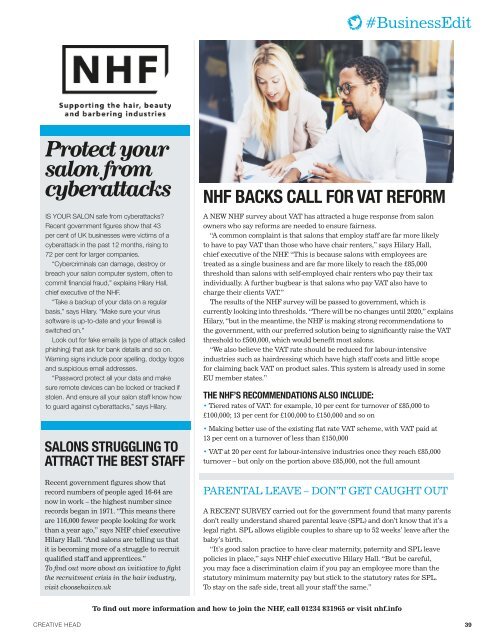CHUK July/August2018
Create successful ePaper yourself
Turn your PDF publications into a flip-book with our unique Google optimized e-Paper software.
#BusinessEdit<br />
Protect your<br />
salon from<br />
cyberattacks<br />
IS YOUR SALON safe from cyberattacks?<br />
Recent government figures show that 43<br />
per cent of UK businesses were victims of a<br />
cyberattack in the past 12 months, rising to<br />
72 per cent for larger companies.<br />
“Cybercriminals can damage, destroy or<br />
breach your salon computer system, often to<br />
commit financial fraud,” explains Hilary Hall,<br />
chief executive of the NHF.<br />
“Take a backup of your data on a regular<br />
basis,” says Hilary. “Make sure your virus<br />
software is up-to-date and your firewall is<br />
switched on.”<br />
Look out for fake emails (a type of attack called<br />
phishing) that ask for bank details and so on.<br />
Warning signs include poor spelling, dodgy logos<br />
and suspicious email addresses.<br />
“Password protect all your data and make<br />
sure remote devices can be locked or tracked if<br />
stolen. And ensure all your salon staff know how<br />
to guard against cyberattacks,” says Hilary.<br />
SALONS STRUGGLING TO<br />
ATTRACT THE BEST STAFF<br />
Recent government figures show that<br />
record numbers of people aged 16-64 are<br />
now in work – the highest number since<br />
records began in 1971. “This means there<br />
are 116,000 fewer people looking for work<br />
than a year ago,” says NHF chief executive<br />
Hilary Hall. “And salons are telling us that<br />
it is becoming more of a struggle to recruit<br />
qualified staff and apprentices.”<br />
To find out more about an initiative to fight<br />
the recruitment crisis in the hair industry,<br />
visit choosehair.co.uk<br />
NHF BACKS CALL FOR VAT REFORM<br />
A NEW NHF survey about VAT has attracted a huge response from salon<br />
owners who say reforms are needed to ensure fairness.<br />
“A common complaint is that salons that employ staff are far more likely<br />
to have to pay VAT than those who have chair renters,” says Hilary Hall,<br />
chief executive of the NHF. “This is because salons with employees are<br />
treated as a single business and are far more likely to reach the £85,000<br />
threshold than salons with self-employed chair renters who pay their tax<br />
individually. A further bugbear is that salons who pay VAT also have to<br />
charge their clients VAT.”<br />
The results of the NHF survey will be passed to government, which is<br />
currently looking into thresholds. “There will be no changes until 2020,” explains<br />
Hilary, “but in the meantime, the NHF is making strong recommendations to<br />
the government, with our preferred solution being to significantly raise the VAT<br />
threshold to £500,000, which would benefit most salons.<br />
“We also believe the VAT rate should be reduced for labour-intensive<br />
industries such as hairdressing which have high staff costs and little scope<br />
for claiming back VAT on product sales. This system is already used in some<br />
EU member states.”<br />
THE NHF’S RECOMMENDATIONS ALSO INCLUDE:<br />
• Tiered rates of VAT: for example, 10 per cent for turnover of £85,000 to<br />
£100,000; 13 per cent for £100,000 to £150,000 and so on<br />
• Making better use of the existing flat rate VAT scheme, with VAT paid at<br />
13 per cent on a turnover of less than £150,000<br />
• VAT at 20 per cent for labour-intensive industries once they reach £85,000<br />
turnover – but only on the portion above £85,000, not the full amount<br />
PARENTAL LEAVE – DON’T GET CAUGHT OUT<br />
A RECENT SURVEY carried out for the government found that many parents<br />
don’t really understand shared parental leave (SPL) and don’t know that it’s a<br />
legal right. SPL allows eligible couples to share up to 52 weeks’ leave after the<br />
baby’s birth.<br />
“It’s good salon practice to have clear maternity, paternity and SPL leave<br />
policies in place,” says NHF chief executive Hilary Hall. “But be careful,<br />
you may face a discrimination claim if you pay an employee more than the<br />
statutory minimum maternity pay but stick to the statutory rates for SPL.<br />
To stay on the safe side, treat all your staff the same.”<br />
To find out more information and how to join the NHF, call 01234 831965 or visit nhf.info<br />
CREATIVE HEAD<br />
39


















